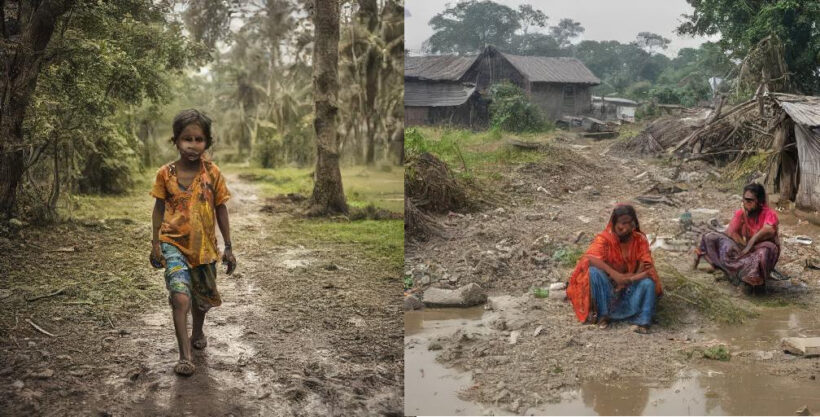In Bangladesh, the convergence of climate change impacts and mental health challenges presents a complex and pressing issue that demands attention and action.
As one of the most vulnerable countries to climate change, Bangladesh faces recurring threats from rising temperatures, air pollution, and devastating floods, each of which profoundly affects the mental well-being of its population. This article delves into the interplay between climate change and mental health in Bangladesh, focusing on the impacts of heat stress, air pollution, and the aftermath of flooding.
Heat Stress: Threats Under a Sweltering Sky
Rising temperatures due to climate change intensify heat stress across Bangladesh, particularly affecting urban areas like Dhaka and coastal regions. The scorching heat poses direct physical health risks and undermines mental well-being. Prolonged exposure to extreme heat can exacerbate stress, anxiety, and fatigue, impair cognitive functions, and elevate the risk of heat-related illnesses among vulnerable populations, including children, the elderly, and individuals with pre-existing mental health conditions. Heatwaves amplify urban heat island effects, exacerbating discomfort and social disparities, underscoring the urgent need for climate-resilient infrastructure and public health interventions to protect mental health.
Air Pollution: Breathing the Burden
Bangladesh grapples with severe air pollution exacerbated by rapid urbanization, industrial growth, and agricultural practices. Particulate matter (PM), ozone, and other pollutants contribute to poor air quality, posing significant threats to respiratory health and mental well-being. High levels of air pollution are linked to increased risks of anxiety disorders, depression, and cognitive impairment, particularly among urban residents and vulnerable communities. As air pollution worsens with climate change, concerted efforts are needed to enforce air quality regulations, promote clean energy solutions, and enhance green urban planning to mitigate the mental health impacts of polluted air.
After Flood: Rebuilding Beyond the Waters
Bangladesh is no stranger to devastating floods, exacerbated by climate change-induced sea-level rise and monsoonal patterns. Flood events displace millions, devastate livelihoods, and disrupt social cohesion, leaving lasting scars on mental health. Survivors often experience trauma, grief, and anxiety in the aftermath, compounded by loss of homes, livelihoods, and community networks. The protracted recovery process, coupled with environmental degradation and economic instability, poses challenges to mental resilience and social well-being. Strengthening disaster preparedness, expanding early warning systems, and integrating psychosocial support services are essential for enhancing community resilience and promoting mental health recovery in flood-prone regions.
Conclusion: Toward Resilience and Adaptation
The complex interplay between climate change and mental health in Bangladesh underscores the need for holistic approaches that prioritize adaptation, mitigation, and mental health considerations. Sustainable development initiatives, including climate-resilient infrastructure, green energy solutions, and community-based adaptation strategies, can mitigate climate impacts and protect mental well-being. Integrating mental health into climate policies, fostering community engagement, and enhancing access to psychosocial support services are essential steps toward building resilience, promoting equity, and safeguarding the mental health of Bangladesh’s population amid the evolving challenges of a changing climate. By addressing the intersection of mental health and climate change, Bangladesh can forge a path toward a sustainable and resilient future for all.






